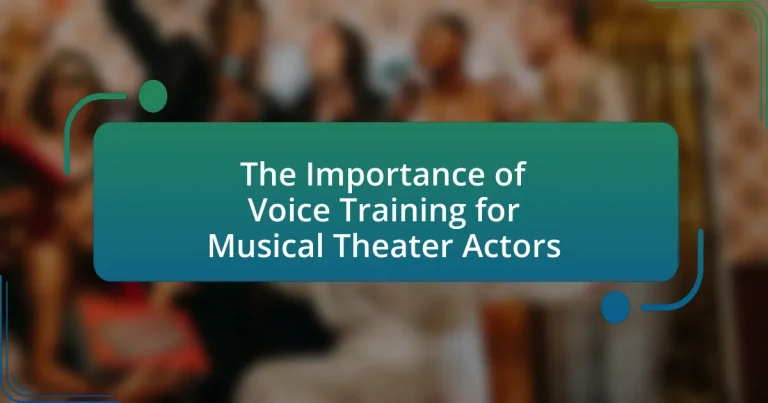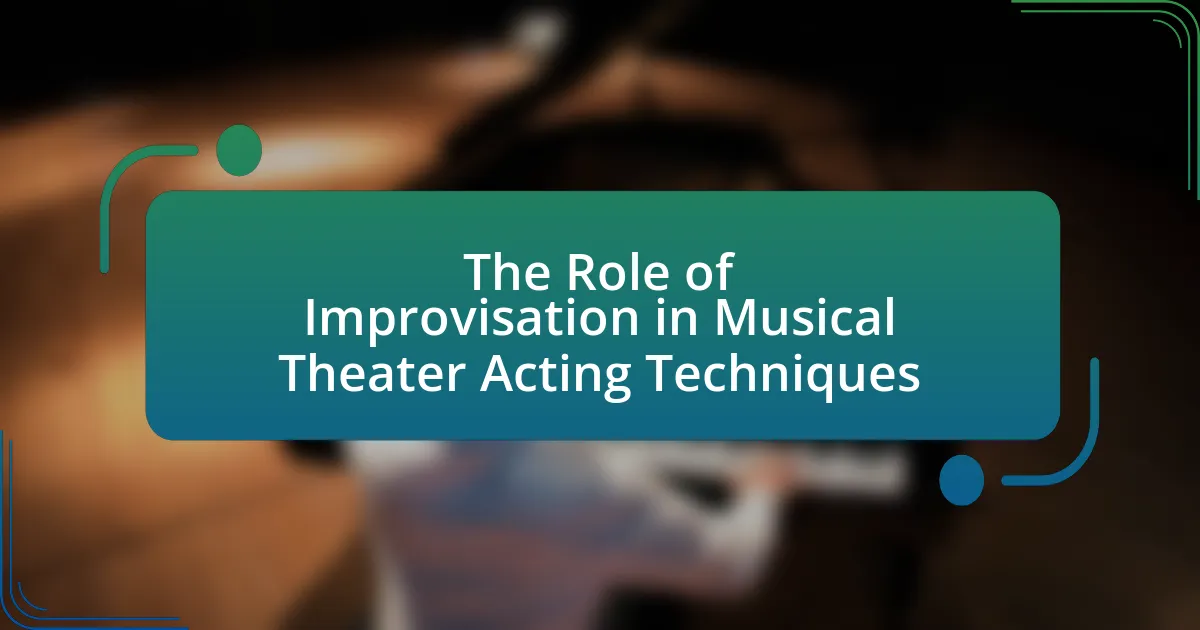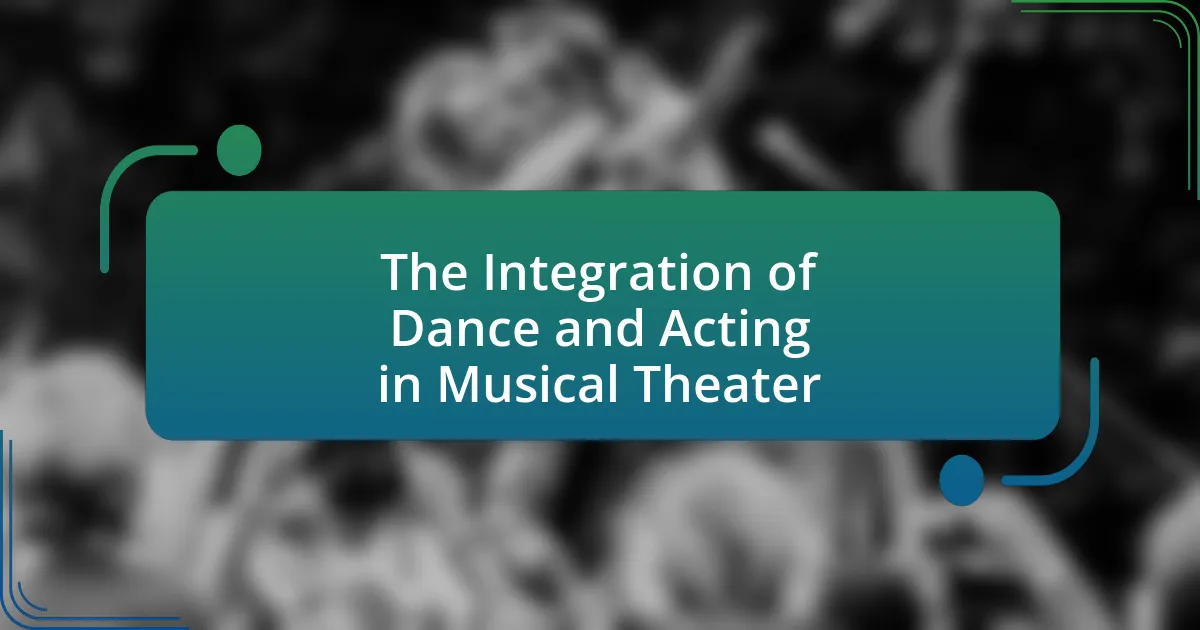Voice training is essential for musical theater actors as it significantly enhances their vocal technique, projection, and versatility, enabling effective performances across diverse roles. The article outlines the importance of proper voice training in developing a strong vocal technique that minimizes strain and injury, while also improving vocal range and control necessary for complex musical pieces. Key vocal techniques taught include breath control, pitch modulation, and articulation, all of which contribute to vocal health and stamina. Additionally, the article discusses the challenges faced by untrained actors, the impact of voice training on character portrayal and emotional expression, and the resources available for actors seeking to improve their vocal skills.

What is the importance of voice training for musical theater actors?
Voice training is crucial for musical theater actors as it enhances vocal technique, projection, and versatility, enabling them to perform effectively in diverse roles. Proper voice training allows actors to develop a strong, healthy vocal technique that minimizes the risk of strain or injury, which is essential given the demanding nature of musical theater performances. Additionally, trained voices can project over orchestras and large audiences without sacrificing vocal quality, ensuring clarity and emotional expression in their performances. Studies have shown that actors with formal voice training often exhibit improved vocal range and control, which are vital for delivering complex musical pieces and character portrayals.
How does voice training enhance performance in musical theater?
Voice training enhances performance in musical theater by improving vocal technique, range, and stamina. This training allows actors to project their voices effectively, ensuring clarity and emotional expression during performances. Research indicates that trained singers can sustain longer notes and navigate complex melodies with greater ease, which is crucial in musical theater where vocal demands are high. Additionally, voice training helps prevent vocal strain and injury, enabling performers to maintain their vocal health over extended runs of shows.
What specific vocal techniques are taught in voice training?
Voice training teaches specific vocal techniques such as breath control, pitch modulation, resonance enhancement, articulation, and vocal health maintenance. Breath control involves managing airflow to support sustained singing, which is essential for musical theater performances. Pitch modulation focuses on the ability to accurately hit and sustain notes, crucial for musical expression. Resonance enhancement techniques help singers project their voices effectively, allowing them to be heard over an orchestra without straining. Articulation techniques improve clarity in singing, ensuring lyrics are understood by the audience. Lastly, vocal health maintenance practices, such as proper warm-ups and hydration, are taught to prevent vocal strain and injury, which is vital for performers who rely on their voices for their craft.
How do these techniques improve vocal health and stamina?
Voice training techniques improve vocal health and stamina by promoting proper vocal technique, breath control, and vocal warm-ups. These practices help prevent strain and injury by ensuring that the vocal cords are used efficiently, reducing the risk of damage. For instance, exercises that focus on diaphragmatic breathing enhance lung capacity and support, allowing for longer phrases and sustained notes without fatigue. Research indicates that consistent vocal training can lead to increased endurance and resilience in vocal performance, as evidenced by studies showing that trained singers exhibit less vocal fatigue compared to untrained individuals.
Why is voice training essential for character portrayal?
Voice training is essential for character portrayal because it enables actors to effectively convey emotions, personality traits, and distinct character voices. Through voice training, actors learn techniques such as breath control, pitch modulation, and articulation, which enhance their vocal range and clarity. This training allows them to embody their characters more fully, making performances more believable and engaging. Research indicates that trained vocalists can project their voices more effectively, which is crucial in musical theater where audience engagement is key. For instance, a study by the National Center for Voice and Speech highlights that proper vocal techniques can significantly improve an actor’s ability to communicate character nuances, thereby enhancing overall performance quality.
How does voice training contribute to emotional expression in performances?
Voice training enhances emotional expression in performances by developing vocal control, range, and resonance, which are essential for conveying feelings authentically. Through techniques such as breath control, pitch modulation, and articulation, actors learn to manipulate their voices to reflect various emotions, allowing them to connect more deeply with their characters and the audience. Research indicates that trained vocalists can express a wider array of emotions effectively, as demonstrated in studies showing that trained singers are better at conveying sadness, joy, and anger through vocal nuances compared to untrained individuals. This ability to express emotions vocally is crucial in musical theater, where the combination of music and acting relies heavily on the voice to communicate the story and emotional depth.
What role does vocal variety play in character development?
Vocal variety is essential in character development as it enhances the emotional depth and authenticity of a character. By utilizing changes in pitch, tone, volume, and pace, actors can convey a character’s personality, mood, and intentions more effectively. Research indicates that vocal variety significantly impacts audience perception, with studies showing that varied vocal delivery can lead to greater engagement and empathy from viewers. For instance, a study published in the Journal of Voice found that actors who employed a wider range of vocal techniques were perceived as more believable and relatable, thus reinforcing the importance of vocal variety in creating compelling characters in musical theater.
What are the challenges faced by musical theater actors without voice training?
Musical theater actors without voice training face significant challenges, including limited vocal range, poor breath control, and inadequate projection. These limitations hinder their ability to perform complex musical pieces effectively, as a trained voice can reach higher notes and sustain them longer. Additionally, without proper training, actors may struggle with vocal health, leading to strain or injury, which can impact their performance longevity. Research indicates that trained singers exhibit greater vocal endurance and resilience, allowing them to perform consistently over extended periods. Thus, the absence of voice training can severely restrict an actor’s capabilities and career opportunities in musical theater.
How can lack of voice training affect audition success?
Lack of voice training can significantly hinder audition success by limiting an actor’s vocal range, control, and overall performance quality. Without proper training, actors may struggle to project their voices, resulting in unclear delivery and diminished emotional expression, which are critical in auditions. Research indicates that trained singers can achieve a vocal range of up to three octaves, while untrained individuals often remain confined to a narrower range, impacting their ability to perform diverse musical pieces effectively. Additionally, voice training enhances breath control, allowing actors to sustain notes longer and deliver powerful performances, which is often a deciding factor in audition evaluations.
What vocal issues can arise from inadequate training?
Inadequate training can lead to several vocal issues, including vocal strain, poor pitch control, and limited vocal range. Vocal strain occurs when singers push their voices beyond their natural limits, often resulting in hoarseness or vocal fatigue. Poor pitch control can arise from a lack of proper techniques, leading to difficulties in staying on key during performances. Additionally, limited vocal range can prevent singers from accessing higher or lower notes, which is essential for musical theater roles that require versatility. Research indicates that singers who do not receive proper training are more susceptible to these issues, as they lack the foundational skills necessary for healthy vocal production.
How can voice training be integrated into a musical theater actor’s routine?
Voice training can be integrated into a musical theater actor’s routine through consistent daily practice, vocal warm-ups, and targeted exercises. Actors should allocate specific time slots each day for vocal exercises that focus on breath control, pitch accuracy, and resonance. Incorporating techniques such as scales, arpeggios, and vocal agility drills can enhance vocal flexibility and strength. Additionally, actors can benefit from working with a vocal coach who can provide personalized feedback and guidance tailored to their specific roles and vocal needs. Research indicates that regular vocal training improves overall performance quality, as evidenced by studies showing enhanced vocal range and stamina in trained singers compared to untrained individuals.
What are the best practices for effective voice training?
The best practices for effective voice training include consistent practice, proper breathing techniques, vocal warm-ups, and hydration. Consistent practice helps develop vocal strength and flexibility, while proper breathing techniques ensure optimal airflow and support for singing. Vocal warm-ups, such as scales and exercises, prepare the voice for performance and prevent strain. Hydration is crucial, as it keeps the vocal cords lubricated, enhancing vocal quality. Research indicates that singers who engage in regular vocal exercises and maintain hydration experience improved vocal performance and reduced risk of injury.
How can actors maintain vocal health during performances?
Actors can maintain vocal health during performances by employing proper vocal techniques, staying hydrated, and avoiding strain. Utilizing techniques such as diaphragmatic breathing and proper resonance helps reduce vocal fatigue. Hydration is crucial, as it keeps the vocal cords lubricated; studies indicate that adequate hydration can significantly improve vocal function. Additionally, actors should avoid shouting or speaking over loud noises, which can lead to vocal damage. Regular warm-ups and cool-downs for the voice are also essential, as they prepare the vocal cords for performance and aid in recovery afterward.
What exercises can actors incorporate into their daily practice?
Actors can incorporate vocal warm-ups, breath control exercises, and articulation drills into their daily practice. Vocal warm-ups, such as humming and lip trills, help to prepare the voice for performance by increasing blood flow and flexibility. Breath control exercises, like diaphragmatic breathing, enhance lung capacity and support sustained vocalization, which is crucial for musical theater. Articulation drills, including tongue twisters, improve clarity and diction, ensuring that lyrics and dialogue are delivered effectively. These exercises are essential for maintaining vocal health and enhancing performance quality in musical theater.
What resources are available for voice training in musical theater?
Resources available for voice training in musical theater include vocal coaches, online courses, workshops, and instructional books. Vocal coaches provide personalized training and feedback, often specializing in musical theater techniques. Online platforms like MasterClass and Coursera offer courses taught by industry professionals, allowing access to expert knowledge from anywhere. Workshops, often hosted by theater companies or educational institutions, provide hands-on experience and group training. Additionally, instructional books such as “The Complete Singer” by David L. Jones and “Sing Smart” by John H. McGowan offer structured guidance on vocal techniques and exercises tailored for musical theater. These resources collectively enhance vocal skills essential for successful performances in the genre.
How can actors find qualified voice coaches?
Actors can find qualified voice coaches by researching local performing arts schools, checking online directories, and seeking recommendations from industry professionals. Performing arts schools often have experienced instructors who specialize in voice training for actors. Online directories, such as the Voice and Speech Trainers Association, provide listings of certified coaches. Additionally, networking with fellow actors and attending workshops can lead to personal referrals, ensuring that the coaches have a proven track record in voice training specific to musical theater.
What online platforms offer voice training courses for actors?
Online platforms that offer voice training courses for actors include MasterClass, Udemy, and Skillshare. MasterClass features courses taught by renowned professionals like Christina Aguilera, focusing on vocal techniques and performance skills. Udemy provides a variety of courses covering different aspects of voice training, including breathing techniques and vocal exercises. Skillshare offers classes that emphasize practical exercises and tips for improving vocal delivery and projection. These platforms are widely recognized for their comprehensive content and accessibility, making them valuable resources for actors seeking to enhance their vocal skills.
What tips can enhance the effectiveness of voice training for musical theater actors?
To enhance the effectiveness of voice training for musical theater actors, consistent practice and vocal exercises are essential. Regularly engaging in warm-ups, such as lip trills and scales, helps to develop vocal range and flexibility. Additionally, actors should focus on breath control techniques, as proper breath support is crucial for sustaining notes and delivering powerful performances. Incorporating feedback from vocal coaches can also significantly improve technique, as personalized guidance helps identify areas for improvement. Research indicates that structured vocal training can lead to measurable improvements in vocal quality and performance stamina, underscoring the importance of these practices in musical theater.




